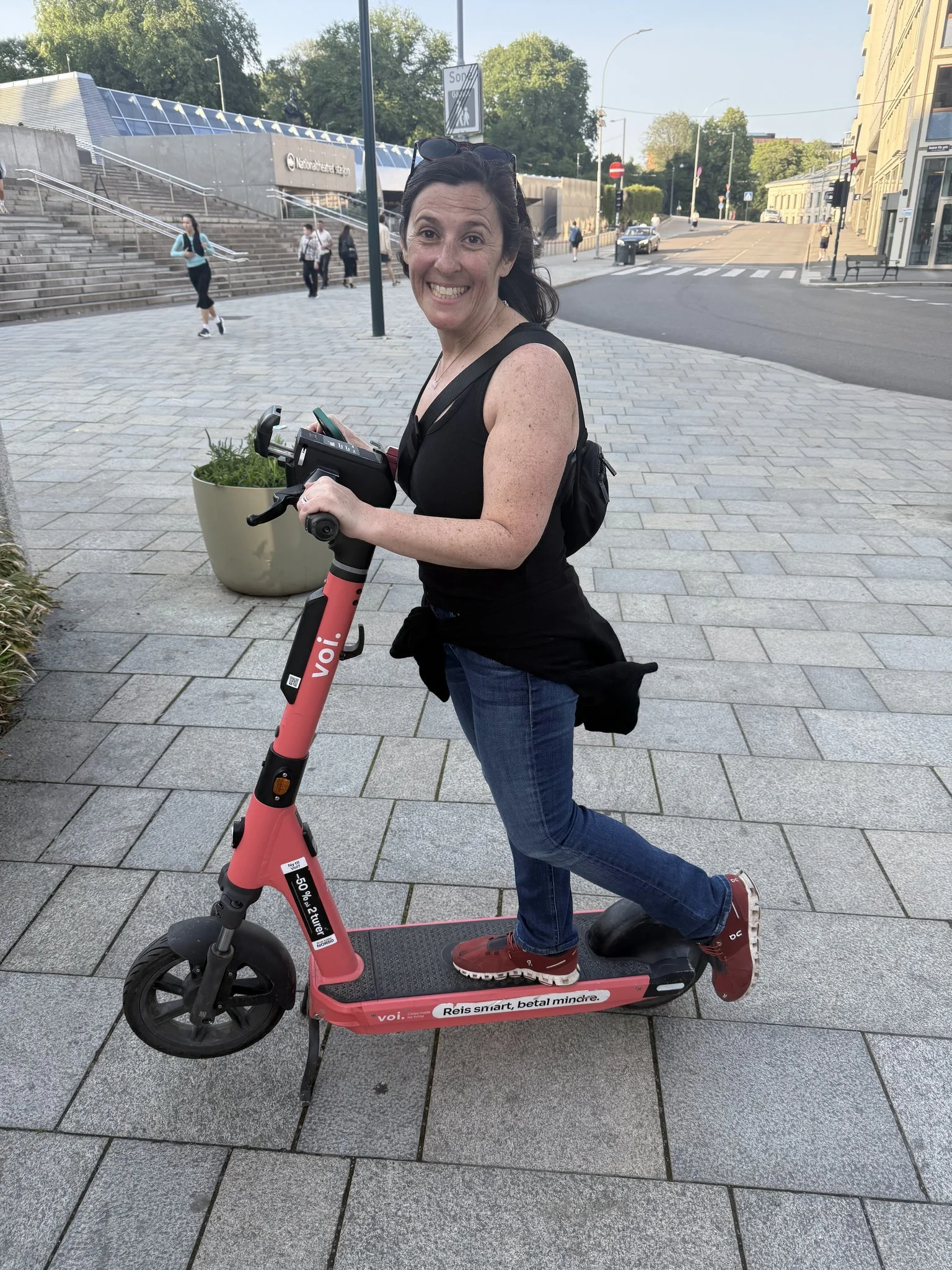From Drama to Clarity: The Power of Leveling Frameworks
Summary:
Stop letting performance conversations happen in the dark. Rachel's approach to leveling frameworks transforms the messiest parts of people management—reviews, promotions, feedback—into clear, fair systems that everyone actually understands. No more guessing, no more politics–just clarity.
What’s in it for you:
You're tired of performance review drama and want a system that actually works
You need everyone on the same page about expectations and growth paths
You want to reduce bias in how you assess and reward people
You're looking for a framework that grows with your organization
Helia’s Perspective
Anything that can quiet the noise and get everyone focused and aligned—with transparency—is one of the best possible things we can do when we're building, growing, or running a company. Teams are what make everything possible, the foundation of it all. We know culture matters, but it's sometimes hard to define or know how to create it.
Rachel's leveling frameworks feel like such a beautiful and powerful backbone to build with and from. Having a clear foundation where folks know exactly where they stand, everyone uses the same language, and there's one shared source of truth—that feels like the kind of infrastructure that lets teams do their best work together. It models the culture you want: transparency, valuing everyone and their contributions, consistency, grounding for good and healthy conversations, honesty. It sets things up to treat humans well, which means less noise and more actual work, more magic, more doing together.
I got to work with Rachel Kleban during her brief stint out of tech and into nonprofits—she taught me so much about management and, most importantly, showed me you could be direct and no-nonsense AND incredibly fun at the same time. When she told me her "superpower" is writing leveling frameworks, I was immediately curious. Rachel has figured out how to take what's often seen as bureaucratic HR paperwork and turn it into the infrastructure that lets incredible teams thrive.
Rachel’s Story
"I always knew I wanted to be in HR before I even knew what it was called," Rachel told me. "I literally said I wanted a job where I could tell other people how to do their jobs better."
That clarity of purpose has driven her entire career, from retail at Gap and Mervyns to her first role in tech in the early stages of Airbnb. But it was at VSCO, a 120-person startup, where things started to click.
"At Airbnb, I learned a ton but never got to design things in my vision because there were a hundred people who had opinions and we tried to meet everybody's needs. When I got to VSCO, they were like, 'Do whatever you want. We hired you to do this.' So I got to take all these ideas and learnings and actually apply them."
Rachel had become obsessed with a fundamental problem: how do you fairly and accurately assess performance? At Airbnb, working on a mission to “create a world where anyone can belong anywhere,” she'd dug deep into anti-bias research. "Any process where humans assess other humans is inherently biased because we are inherently biased. You can do all the bias training you want, but the most impactful thing you can do is design systems that mitigate that bias."
The answer? Consistent criteria that everyone is held to. Clear expectations that are the same for everyone at each level.
At VSCO, Rachel built a leveling framework that wasn't just a document—it became the foundation for everything they did. Performance reviews, spot bonuses, promotions, feedback conversations. All of it anchored back to the same clear expectations.
Then came the moment that changed everything.
"I did a retro after we rolled out the new performance review process that was built on our leveling framework," Rachel said. "I talked to one employee who always had something to say and I wanted their feedback because they would tell me what was wrong with it."
Instead, they said: "Oh, it was great. I know exactly what's expected of me in my job and I know exactly what I need to do to get promoted."
"That was my HR mic drop moment of all time," Rachel laughed. "That's all we want for people. Show up to work, know what you're supposed to do, know how to do a good job today, and if you want to grow, know how to get there."
I am obsessed with afternoon tea. Had the most amazing Japanese inspired tea service in London this summer and I can't stop thinking about it!
What this Looks Like in Practice
-
Rachel's process begins with understanding why you're doing this, not what levels you need. "I always ask: it's a year from now and your leveling framework's been a huge success. What's different in the organization?" The answers paint the picture: employees don't complain anymore, everyone knows what's expected, managers know how to give feedback.
Then she digs into what good actually looks like—who are your successful people, what are your core values, what behaviors do you need to hit your long-term goals? Only after understanding the culture and expectations does she build the actual framework. But here's the key: most companies treat leveling frameworks like nice-to-have documentation. Rachel treats them like the operating system for everything people-related—performance reviews, recognition, promotions, feedback conversations, all anchored back to the same clear expectations.
These expectations quieted the noise that comes with lack of clarity. “I was getting questions like, ‘Why am I not promoted? Why did that team have three directors and we don't have any? My review is not fair.’ Every review cycle would spawn up disagreement and distress and drama." After implementing her system? "It just truly quieted down because it was very clear where they were or were not meeting expectations."
-
The biggest mistake Rachel sees? Overcomplicating everything. "At Airbnb, we made a company-wide framework and then the plan was to do functional frameworks. I sat down with every HRBP and said, 'What functional frameworks do you need?' The list was 98. I said, 'No thank you.'"
Her approach: build one company-wide framework first. Train managers to translate those general expectations into specific examples for their teams. "The goal is for the expectation of a director in engineering to be the same as a director in marketing and HR so you can calibrate across teams." This prevents the classic "why do they have three directors and we don't have any?" complaints.
People want frameworks to be so specific they answer every question, but Rachel's philosophy is simple: "This is a baseline, a starting point for meaningful conversations. We have to use our discretion and what we know." Build for your future—have seven levels even if you're only using three—and start earlier than feels comfortable.
Secret Sauce & Takeaways
Start early, start sooner: "Start so early, earlier than feels comfortable. Build it for the future—you could have seven levels and only be using three, but you know you're going to need them."
Use it incessantly: "Talk about it all the time, find a million ways to bring it out and use it throughout the year. Build your performance review on top of it."
Train managers on two critical skills: “First, how to translate general expectations into specific, relevant examples for their team members. Second, how to anchor all feedback conversations in the framework expectations using ESBI (Expectation, Situation, Behavior, Impact) instead of just SBI. "It's anchoring the feedback to something that's solid, something they already know."
Write it in second person: "Say ‘You communicate clearly and concisely with your coworkers’ rather than ‘communicates clearly and concisely.’ I want employees to see themselves in it and relate it to themselves."
Don't overthink functional differences: "Differentiation leaders want to make are often so minute that at the end of the day, you don't really need separate frameworks. The general one works."
I am terrified of speed-related things. Happy to be on the back of a motorcycle or tandem skydiving, but it's a whole other thing when I am in charge. Here is me conquering my fear of motorized scooters in Oslo. Can you see the panic in my eyes?!
Questions to Ask Yourself
What "noise" are you hearing around performance, promotions, or fairness? How much time do you spend managing that drama?
Do people in your organization know exactly what's expected of them and how to grow?
When was the last time someone got promoted and others thought it was unfair or unclear why?
Are your managers giving specific, actionable feedback anchored to clear expectations?
How much time do you spend in "he said, she said" conversations about performance?
Want to Try This?
Templates & Guides:
Sample frameworks that you can review and customize + build from!!!
You can work with Rachel (or others!) to support at REALLY reasonable rates (recommend!) and, when you want to DIY and leverage AI (a good place to start - will probably get you ~70% of the way there), HERE’s our guide.
LevelUp’s Guide to Rolling out is HERE - general framework with each step to take
When looking to translate a leveling chart into specific expectations by role (versus having leveling charts for every team + department, see HERE for The Management Center’s Role Expectations Template and HERE for Level Up’s!
Recommended Reads:
Leveling Frameworks: A Step-By-Step Approach by Rachel with more on the philosophy AND the how-to
Learn more about the Situation, Behavior, Impact feedback model (learn more from CLC who created the model HERE) AND read more HERE on how Rachel expands it to be the EXPECTATION, Situation, Behavior, Impact model.
Connections:
Rachel and her team at LevelUp for DIY templates and rollout plans. For $3K, you get a custom LevelUp leveling framework, communication plan template and talking points and manager and employee training decks
For full hands-on implementation, LevelUp, Nina Jacinto and Sophia Zisook are all fabulous resources!!!!
About the Library Contributor
Rachel Kleban has been in HR longer than she wants to admit, from retail to tech to building her own company. She's that rare combination of deeply practical and refreshingly direct—the person who can tell you exactly where you are and how to get to the next.
She's currently building LevelUp to make leveling frameworks accessible to smaller companies who can't afford full consulting AND need better systems. When she's not writing frameworks, she's at OpenPhone as their VP of People, putting these systems into practice.
Connect with Rachel onLinkedIn or check outLevelUp. Fair warning: she might tell you your current system isn't working—but she'll also tell you exactly how to fix it.
This article comes from a coffee chat with Rachel in June 2025. These conversations form the heart of the Helia Library – because I've learned the most from doing and from talking with other doers willing to share their wisdom. We don't need to start from blank pages or do it all alone.
As always, take what's helpful, leave what's not, and make it your own.
Article & Resource Tags



